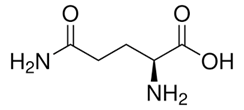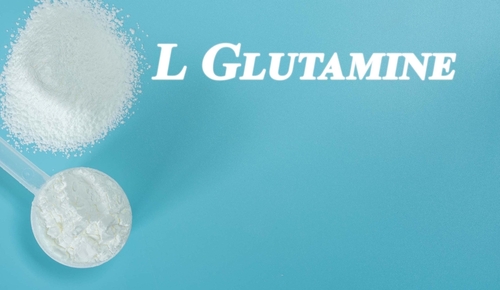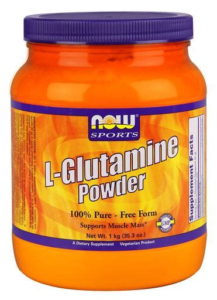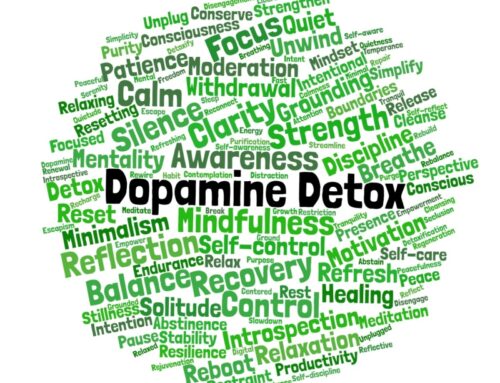 L-Glutamine, a non-essential amino acid, is vital for the immune system, muscle recovery, and intestinal health, especially among athletes. It supports protein synthesis and nourishes immune and intestinal cells. Glutamine supplements are commonly used to enhance post-exercise recovery and immune function. We have been recommending L-glutamine to patients for 20 years and love seeing the results.
L-Glutamine, a non-essential amino acid, is vital for the immune system, muscle recovery, and intestinal health, especially among athletes. It supports protein synthesis and nourishes immune and intestinal cells. Glutamine supplements are commonly used to enhance post-exercise recovery and immune function. We have been recommending L-glutamine to patients for 20 years and love seeing the results.
1. IMPROVED MUSCLE RECOVERY WITH L-GLUTAMINE
L-Glutamine plays an essential role in muscle recovery, making it a preferred supplement for athletes, bodybuilders, and anyone engaged in regular physical activity. Here’s how it works and why it’s so crucial:
Accelerated Muscle Repair
- Protein Synthesis: L-Glutamine promotes protein synthesis, a crucial process in repairing and rebuilding damaged muscle fibers after exercise. This helps accelerate recovery and prepares the muscles for the next workout sessions.
- Reduction of Muscle Damage: By increasing glutamine levels in the body, one can reduce the extent of muscle damage caused by intense exercise, allowing for quicker and more effective recovery.
REDUCTION OF MUSCLE FATIGUE
- Acidity Buffer: During intense exercise, muscles produce lactic acid, which can lead to muscle fatigue. L-Glutamine helps regulate acid buildup in muscles, reducing the sensation of fatigue.
- Energy Reserve: It also serves as an energy source for muscle cells, especially during prolonged exercises, aiding in maintaining endurance and performance.
2. IMMUNE SYSTEM SUPPORT WITH L-GLUTAMINE.
L-Glutamine is a crucial element for maintaining a strong and responsive immune system. Its presence and action in the body play a significant role in protecting against infections and diseases, especially for individuals experiencing intense physical stress, such as athletes. Here’s how it contributes to strengthening immune defenses:
ENERGY SOURCE FOR IMMUNE CELLS
- Fuel for Leukocytes: L-Glutamine serves as the primary source of energy for various immune system cells, including leukocytes (white blood cells). Adequate L-Glutamine intake is, therefore, essential for their optimal functioning.
- Support for Immune Cell Proliferation: It promotes the growth and multiplication of immune cells, which is crucial for a rapid and effective immune response against pathogens.
REDUCTION OF EXERCISE-INDUCED IMMUNODEPRESSION
- Prevention of Post-Exercise Immune Decline: Intense workouts can temporarily weaken the immune system. L-Glutamine supplementation can help prevent this decline, thereby protecting the body against infections.
ANTI-INFLAMMATORY EFFECTS
- Reduction of Systemic Inflammation: It can help modulate the body’s inflammatory response, which is beneficial not only for reducing the risk of chronic diseases but also for maintaining an efficient immune system.
3. INTESTINAL HEALTH: THE KEY ROLE OF L-GLUTAMINE
L-Glutamine plays a major role in maintaining intestinal health. Its presence in the body significantly influences the integrity of the intestinal wall and overall digestive function. Here’s how it works and why it is crucial for intestinal health:
MAINTAINING THE INTEGRITY OF THE INTESTINAL WALL
- Reinforcement of the Intestinal Barrier: L-Glutamine is essential for maintaining the strength and integrity of the intestinal wall. It helps prevent intestinal permeability, commonly known as “leaky gut syndrome,” where harmful substances can pass into the bloodstream.
- Cellular Regeneration: It promotes the regeneration and repair of intestinal mucosal cells, which is crucial after damage caused by inadequate diet, infections, or certain medications.
SUPPORT FOR DIGESTIVE FUNCTION
- Optimization of Nutrient Absorption: By maintaining the health of the intestinal wall, L-Glutamine optimizes the absorption of essential nutrients, which is crucial for overall optimal health.
- Reduction of Intestinal Inflammation: It can help reduce inflammation in the gastrointestinal tract, beneficial for individuals suffering from inflammatory bowel disorders such as Crohn’s disease or ulcerative colitis.
IMPACT ON GUT FLORA
- Microbial Balance: L-Glutamine plays a role in supporting a healthy intestinal microbiome, which is essential for digestion, immunity, and even mental health.
4. BLOOD SUGAR BALANCE: THE IMPACT OF L-GLUTAMINE
L-Glutamine plays a significant role in regulating blood sugar levels, which has important implications for energy and weight management. Here’s how it contributes to this crucial balance:
STABILIZATION OF BLOOD SUGAR LEVELS
- Glycemic Modulation: L-Glutamine can influence blood sugar by helping regulate the release and utilization of glucose by the body. This is particularly useful after meals and during fasting periods.
- Reduction of Glycemic Peaks: By stabilizing glucose levels, L-Glutamine helps prevent sudden spikes and drops in blood sugar, which can lead to cravings and overeating.
SUPPORT FOR INSULIN SENSITIVITY
-
Enhancement of Insulin Response: It can improve insulin sensitivity, which is beneficial for individuals with insulin resistance or a risk of developing type 2 diabetes.
MANAGEMENT OF ENERGY AND WEIGHT
- Appetite Control: By regulating blood sugar, L-Glutamine can help control appetite, which is a key factor in weight management.
- Metabolism Support: Stable blood sugar promotes efficient metabolism, which can aid in maintaining or losing weight, depending on personal goals.
5. REDUCTION OF MUSCLE CATABOLISM WITH L-GLUTAMINE
L-Glutamine is essential to prevent muscle breakdown, a process known as catabolism, especially during periods of physical stress or recovery. It helps prevent muscle breakdown, supports protein synthesis, and enhances recovery after physical stress. For athletes and individuals in recovery, L-Glutamine is an essential supplement to maintain muscle health and strength. Here’s how it contributes to muscle protection:
PREVENTION OF MUSCLE DEGRADATION
- Catabolism Inhibition: L-Glutamine helps inhibit the processes that lead to the breakdown of muscle proteins, especially during stressful situations for the body, such as intense training or illness.
- Maintenance of Muscle Mass: By reducing catabolism, L-Glutamine helps preserve muscle mass, which is crucial for athletes, bodybuilders, and anyone in a recovery phase.
6. IMPROVEMENT OF PROTEIN SYNTHESIS BY L-GLUTAMINE
L-Glutamine, as an amino acid, plays a crucial role in promoting protein synthesis, a fundamental process for muscle growth and repair. Here’s how it works and why it’s so important:
KEY ROLE IN PROTEIN SYNTHESIS
- Stimulation of Protein Production: L-Glutamine acts as a stimulator of protein synthesis in muscle cells, promoting muscle growth and repair after exercise.
- Prevention of Muscle Loss: By increasing protein synthesis, L-Glutamine helps prevent muscle loss, especially during periods of stress or recovery.
- Acceleration of Recovery: Efficient protein synthesis is essential for fast and complete muscle recovery, especially after intense workouts or injuries.
- Promotes Muscle Hypertrophy: L-Glutamine can contribute to muscle hypertrophy (increase in muscle fiber size) by optimizing protein synthesis, a crucial aspect for bodybuilders and athletes.
- Positive Nitrogen Balance: L-Glutamine helps maintain a positive nitrogen balance in the body, a key indicator of efficient protein synthesis and an anabolic state (muscle building).
7. COGNITIVE SUPPORT: THE IMPACT OF L-GLUTAMINE ON BRAIN HEALTH
L-Glutamine, beyond its physical health benefits, also plays a significant role in supporting brain health and cognitive function. This is largely due to its role in neurotransmitter synthesis. Here’s how it contributes to brain health:
ROLE IN NEUROTRANSMITTER SYNTHESIS
- Neurotransmitter Precursor: L-Glutamine is a precursor to some important neurotransmitters, such as glutamate and GABA (gamma-aminobutyric acid). These neurotransmitters are essential for regulating neuronal activity.
- Neurochemical Balance: By contributing to the synthesis of these neurotransmitters, L-Glutamine helps maintain a neurochemical balance in the brain, which is crucial for cognitive function and mood.
ENHANCEMENT OF COGNITIVE FUNCTION
- Concentration and Mental Clarity: Adequate availability of neurotransmitters can enhance concentration, mental clarity, and the ability to focus, which is beneficial in daily activities and professional performance.
- Neuronal Protection: L-Glutamine can help protect neurons against damage and oxidative stress, thereby contributing to the prevention of age-related cognitive decline.
8. STRESS AND FATIGUE MANAGEMENT WITH L-GLUTAMINE
L-glutamine is a valuable ally in the fight against stress and fatigue, especially those related to physical exercise. Its action in the body helps to mitigate the effects of stress and improve recovery. Here’s how it works:
REDUCTION OF PHYSIOLOGICAL STRESS
- Reduction of Post-Exercise Fatigue: After intense exercise, the body’s glutamine reserves can be depleted, contributing to fatigue. Supplementation with L-glutamine helps replenish these reserves, thereby reducing fatigue and speeding up recovery.
- Modulation of Stress Response: L-glutamine can positively influence stress hormones such as cortisol, thus helping to moderate physiological responses to stress.
- Reduction of Stress and Anxiety: GABA, whose synthesis is supported by L-Glutamine, plays a role in reducing stress and anxiety, contributing to better mental health.
SUPPORT FOR MUSCLE RECOVERY
- Acceleration of Muscle Recovery: By promoting protein synthesis and reducing muscle catabolism, L-glutamine helps muscles to repair more quickly after exercise, contributing to an overall sense of well-being and reduced fatigue.
ENHANCEMENT OF ENDURANCE
- Increase in Endurance and Performance: By reducing fatigue and supporting muscle recovery, L-glutamine can indirectly contribute to improving endurance and performance during subsequent training sessions.
9. CELLULAR HYDRATION AND L-GLUTAMINE: A DYNAMIC DUO
 L-glutamine plays a crucial role in cellular hydration, an essential factor for the health and optimal functioning of cells, especially muscle cells. Here’s how it contributes to this vital process:
L-glutamine plays a crucial role in cellular hydration, an essential factor for the health and optimal functioning of cells, especially muscle cells. Here’s how it contributes to this vital process:
ENHANCEMENT OF CELLULAR HYDRATION
- Increased Cellular Volume: L-glutamine helps regulate cellular volume by promoting the entry of water into cells. This increased hydration is crucial for proper cellular functioning and overall health.
- Support for Muscle Anabolism: Adequate cellular hydration is essential for muscle anabolism, the process of building muscle tissues. Well-hydrated cells are more effective in protein synthesis, which is beneficial for muscle growth.
IMPACT ON PERFORMANCE AND RECOVERY
- Performance Enhancement: Adequate cellular hydration can improve sports performance as well-hydrated cells function optimally, allowing for better endurance and strength.
- Acceleration of Recovery: Cellular hydration plays a role in post-exercise recovery, helping muscle cells repair and regenerate more efficiently.
10. WEIGHT MANAGEMENT SUPPORT WITH L-GLUTAMINE
L-glutamine, a versatile amino acid, plays a significant role in weight management, primarily due to its ability to stabilize blood sugar levels. Here’s how it contributes to this crucial aspect of health:
STABILIZATION OF BLOOD SUGAR LEVELS
- Glucose Regulation: L-glutamine helps regulate blood glucose levels, which is essential for maintaining a balanced metabolism and preventing sugar spikes that can lead to cravings.
- Prevention of Cravings: By stabilizing blood sugar, L-glutamine can reduce sugar cravings and hunger, thus helping control calorie intake and avoid impulsive snacking.
SUPPORT FOR APPETITE REGULATION
- Appetite Modulation: L-glutamine can influence hunger-related hormones like ghrelin and satiety hormones, thus contributing to better appetite regulation.
- Feeling of Fullness: By helping regulate appetite, L-glutamine can increase the feeling of fullness after meals, which is a key factor in weight management.
IMPACT ON METABOLISM
- Metabolic Support: Stable blood sugar levels promote efficient metabolism, which can help maintain or reduce body weight, depending on individual goals.
L-glutamine is a safe and easy supplement that can be added to almost anyone’s diet. A daily recommended dose is between 5-10g per day. We recommend that you always take L-glutamine in a powder form and not a capsule. It can be easily mixed into water or taken off of a spoon. We are happy to answer any questions that you have about L-glutamine as we strive to be a resource in helping you become healthier than you have ever been.







